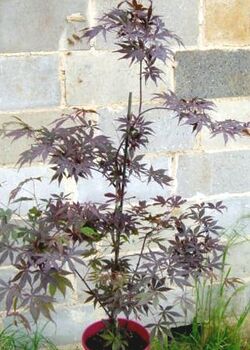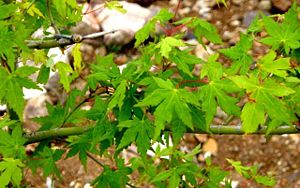Acer palmatum: Difference between revisions
imported>Aleta Curry (+ photo - okay, I hate this, it took too long to do and doesn't look right) |
imported>Aleta Curry m (format fixes) |
||
| Line 18: | Line 18: | ||
The latin name ''Acer palmatum'' comes from the similarity between the shape of the leaves and the shape of a human hand. The common name “Japanese Maple” is a bit confusing because the species ''Acer japonica'' and ''Acer nipponicum'' exist as well, and, as their names imply, they, like many [[maple]]s or acers, also originated in Japan. In addition, some of the varieties of these species (and many of the other acers) look so similar that they could easily be mistaken for varieties of one of the others. Although most references restrict the use of the name “Japanese Maple” to “acer palmatum” it is infrequently used to refer to ''Acer japonica'' as well. The situation is a confusing one. | The latin name ''Acer palmatum'' comes from the similarity between the shape of the leaves and the shape of a human hand. The common name “Japanese Maple” is a bit confusing because the species ''Acer japonica'' and ''Acer nipponicum'' exist as well, and, as their names imply, they, like many [[maple]]s or acers, also originated in Japan. In addition, some of the varieties of these species (and many of the other acers) look so similar that they could easily be mistaken for varieties of one of the others. Although most references restrict the use of the name “Japanese Maple” to “acer palmatum” it is infrequently used to refer to ''Acer japonica'' as well. The situation is a confusing one. | ||
[[Image:Acer Palmatum foliage in spring.JPG|left|thumb|300px|{{#ifexist:Template:Acer Palmatum foliage in spring.JPG/credit|{{Acer Palmatum foliage in spring.JPG/credit}}<br/>|}}''Acer palmatum foliage in spring.]]'' Acer palmatum'' is frequently planted as a [[specimen tree]] and makes a good subject for [[bonsai]]. They are prized because they have year-round interest: bare stems in winter; delicate foliage in changing tones in spring, and beautiful hues in autumn. In addition, some, like '' A. palmatum | [[Image:Acer Palmatum foliage in spring.JPG|left|thumb|300px|{{#ifexist:Template:Acer Palmatum foliage in spring.JPG/credit|{{Acer Palmatum foliage in spring.JPG/credit}}<br/>|}}''Acer palmatum'' foliage in spring.]]''Acer palmatum'' is frequently planted as a [[specimen tree]] and makes a good subject for [[bonsai]]. They are prized because they have year-round interest: bare stems in winter; delicate foliage in changing tones in spring, and beautiful hues in autumn. In addition, some, like those of the '' A. palmatum dissectum'' group, have extraordinarily shaped leaves and colour. Further, they are difficult for the novice to propagate, and this adds to their value. | ||
Synonym:Acer palmatum subsp. palmatum | Synonym:Acer palmatum subsp. palmatum | ||
Synonym:Acer palmatum var. palmatum | Synonym:Acer palmatum var. palmatum | ||
Revision as of 15:16, 12 November 2007
| Japanese Maple | ||||||||||||||
|---|---|---|---|---|---|---|---|---|---|---|---|---|---|---|
| Scientific classification | ||||||||||||||
| ||||||||||||||
| Binomial name | ||||||||||||||
| Acer palmatum Thunb. |
Acer palmatum is a well-known deciduous tree commonly called the “Japanese Maple”. It is very popular among homeowners, gardeners and horticulturalists and is believed to have been in cultivation for over three hundred years.
The latin name Acer palmatum comes from the similarity between the shape of the leaves and the shape of a human hand. The common name “Japanese Maple” is a bit confusing because the species Acer japonica and Acer nipponicum exist as well, and, as their names imply, they, like many maples or acers, also originated in Japan. In addition, some of the varieties of these species (and many of the other acers) look so similar that they could easily be mistaken for varieties of one of the others. Although most references restrict the use of the name “Japanese Maple” to “acer palmatum” it is infrequently used to refer to Acer japonica as well. The situation is a confusing one.
Acer palmatum is frequently planted as a specimen tree and makes a good subject for bonsai. They are prized because they have year-round interest: bare stems in winter; delicate foliage in changing tones in spring, and beautiful hues in autumn. In addition, some, like those of the A. palmatum dissectum group, have extraordinarily shaped leaves and colour. Further, they are difficult for the novice to propagate, and this adds to their value.
Synonym:Acer palmatum subsp. palmatum Synonym:Acer palmatum var. palmatum

